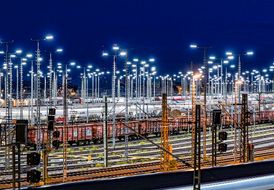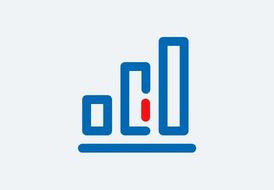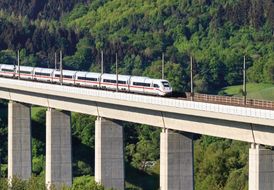Development of the infrastructure
In 2021, about€ 12.8 billion was invested in renewing and maintaining the network, stations and energy facilities. This includes LuFV funds (grants and DB funds) amounting to€ 5.5 billion and€ 2.7 billion for maintenance.
The impact of the Covid-19 pandemic on construction projects was kept to a minimum by means of effective crisis management. In many cases, close monitoring and targeted countermeasures enabled us to resolve any disruptions that occurred quickly in cooperation with the construction industry.
In 2021, the following construction starts and commissions took place as part of the requirement plan and the Municipal Transport Financing Act (Gemeindeverkehrsfinanzierungsgesetz; GVFG):
| CONSTRUCTION BEGAN IN 2021 | |
| PROJECT NAME | PROJECT DESCRIPTION |
Nuremberg — Erfurt expansion line and new construction line (German unification transport project no. 8.1) |
|
Halle/Leipzig hub |
|
Rhine-Ruhr-Express |
|
Angermünde — Stettin expansion line |
|
Karlsruhe — Offenburg— |
|
Uelzen — Stendal — Magdeburg — Halle expansion line (East corridor North) |
|
Weddel loop |
|
New construction of S-Bahn (metro) line S4 (East) |
|
| COMMISSIONED IN 2021 | |
| PROJECT NAME | PROJECT DESCRIPTION |
Halle/Leipzig hub |
|
Hamburg hub |
|
Rhine-Ruhr-Express |
|
Nuremberg — Ingolstadt — |
|
Berlin hub |
|
Frankfurt am Main hub |
|
Ulm — Friedrichshafen — Lindau expansion line |
|
Breisgau S-Bahn (metro) |
|
In addition, the following requirement plan and Municipal Transport Financing Act projects were under construction in 2021:
| PROJECTS UNDER CONSTRUCTION IN 2021 | |
| PROJECT NAME | PROJECT DESCRIPTION |
Stelle — Lüneburg expansion line |
|
Berlin — Dresden expansion |
|
Nuremberg — Erfurt expansion line and new construction line (German unification transport project no. 8.1) |
|
Leipzig — Dresden expansion line (German unification |
|
Karlsruhe — Stuttgart — Nuremberg — Leipzig/ |
|
Ludwigshafen — Saarbrücken |
|
Stuttgart — Ulm — Augsburg |
|
Karlsruhe — Offenburg — |
|
Oldenburg — Wilhelmshaven/Langwedel — Uelzen expansion line |
|
(Amsterdam)—German/ |
|
Frankfurt am Main hub |
|
Combined transport |
|
Hanau — Würzburg/Fulda — |
|
Rhine-Ruhr-Express |
|
740 m network |
|
Hamburg hub |
|
Cologne— Aachen expansion line |
|
Rhine-Main S-Bahn (metro) |
|
Rhine-Neckar local fast transport |
|
Nuremberg S-Bahn (metro) |
|
Munich S-Bahn (metro) |
|
Berlin S-Bahn (metro) |
|
At the end of 2021, a total of 176 requirement plan and Municipal Transport Financing Act projects were in planning and under construction. Further information on the projects are available on the Construction Information Portal (BauInfoPortal) Web site.
Key developments in 2021:
- Stuttgart 21: The project involves restructuring the Stuttgart rail hub to include four new stations and over 57 km of new lines, which will enable shorter travel times, more frequent journeys and a greater number of direct connections. By the end of 2021, a total of 18 chalice-shaped pillars had been constructed in the station hall of the new central station, and expansion work had begun at the northern end of the station. At over 54 km in length, more than 92% of the tunnels have been bored and excavated. Starting in mid-2021, some tunnel structures were handed over to the slab track phase and railway engineering.
- Wendlingen — Ulm new construction line: The new line of about 60 km will merge seamlessly with Stuttgart 21, connecting Stuttgart to Ulm at speeds of up to 250 km/h. Combined with Stuttgart 21, travel times between the two cities will be cut in half. In July 2021, the superstructure of the second bridge construction of the Filstal Bridge was completed, meaning that there is now a seamless connection between Ulm and Wendlingen. The work on the slab track phase and railway engineering was largely completed, and trial operations are scheduled to commence in February 2022.
- Cologne hub: The Cologne hub is to be expanded through a total of 17 infrastructure measures. In the Cologne — Aachen expansion line project 4, work in the Aachen-Rothe Erde area is still in the implementation phase. Previously completed work was damaged by the floods in July 2021, as was the Aachen — Mönchengladbach detour line. The restoration of the damaged infrastructure and the rescheduling of the track closures required for construction operations will result in a postponement of the commissioning date. Construction work in the S13 Troisdorf — Bonn-Beuel expansion line project is progressing as scheduled.
- Oldenburg — Wilhelmshaven expansion line: Since 2011, the two-track expansion and electrification of the Oldenburg — Wilhelmshaven line to provide a high-volume connection to the deep-water port of Jade-WeserPort has been carried out in several phases of construction. Track construction at Sande station has been completed, and the bypass track to facilitate the construction of the new Alexanderstrasse bridge has gone into operation in Oldenburg. Overhead wire work has started on all sections. Construction of the new Rastede substation, the Oldenburg switching station and the two autotransformer stations commenced in June 2021. The most recent plan approval decision (plan approval section 6.2) was issued in June 2021; construction began in July 2021.
- Dresdner Bahn: The Dresdner Bahn is being made fit for modern local, regional and long-distance transport. This will reduce the burden on the Berlin railway hub and facilitate shorter travel times. The main construction work is currently underway in all sections. Among other things, construction began in 2021 on the connection curve that will link the Dresden railway to Berlin Brandenburg Airport, and the substitute platform in Lichtenrade was commissioned.
- Berlin — Dresden expansion line: 125 km of the line from Berlin to Dresden will be upgraded to support speeds of up to 200 km/h. The first construction phase is currently being implemented. The construction financing agreement for Zossen station was concluded in February 2021. Draft planning is currently in progress for the second construction phase (performance phase 3).
- Leipzig — Dresden (German Unification Transport Project No. 9): Once the works are complete, higher speeds of up to 200 km/h and therefore shorter travel times, will be possible. In addition, some of the burden on the existing infrastructure will be relieved. Starting in September 2021, the first track in the Zeithain — Leckwitz section is being newly constructed in its final location. Train traffic can continue rolling on the other track. The command and control technology required for this was commissioned in September 2021.
- Nuremberg — Ebensfeld expansion line: The aim is to renew the existing two-track expansion line for the S-Bahn (metro)/regional and freight transport to support speeds of 160 km/h and to construct two additional tracks to operate at a speed of 230 km/h. The construction permit was granted for the 10 km line in plan approval section 21 (Eggolsheim — Strullendorf) in May 2021. Construction started in June 2021. In plan approval section 23 (Hallstadt— Breitengüssbach), platforms and new tracks around the Hallstadt station, among other elements, were commissioned in March 2021. Further outstanding track construction work was completed and went into operation by December 2021. The four-track section of plan approval section 23 (Hallstadt — Breitengüssbach) will be commissioned in April 2022.
- Outer Halle hub: The overall conversion project at the Halle (Saale) hub will increase the volume capacity of the hub for future traffic growth. The old bridges in the Merseburger Strasse area were removed in February 2021. The new segments were inserted in July 2021. In addition, tracks and platforms were renewed and the mechanical interlockings replaced by a new electronic interlocking. The section of line was cleared for operation again in December 2021.
- Expansion line 46/2 (Emmerich — Oberhausen): In order to handle the increased international freight and passenger transport, DB Group will make extensive structural changes to the line over the next few years. The core element of the project is the three-track expansion of the line in order to increase line capacity and optimize operational processes. Five out of 12 plan approval decisions have now been granted. Construction work on the expansion line has begun and will be expanded as the other decisions are granted.
- Angermünde — Szczecin expansion line: The expansion for speeds up to 160 km/h, end-to-end electrification and the construction of a second track will facilitate shorter travel times, more trains on the line and climate-friendly transport. The Federal Government and DB Group signed the financing agreement in March 2021. The first construction permit for the upgrade of the line between Angermünde and Stettin was granted in April 2021. Work between Angermünde and Passow was started in November 2021 as planned.
- Relocation of the Hamburg-Altona train station: The new Hamburg-Altona station will provide a better and more comprehensive service for passengers. The ground-breaking ceremony took place in July 2021. Underground cabling work was carried out in 2020, with various temporary cable bridges being set up and structures decommissioned. All construction work proceeded on schedule.
- Frankfurt am Main hub: The railway hub in Frankfurt am Main is one of the most heavily used transport hubs in the German rail network:
- In the Nordmain S-Bahn (metro) project plan approval section 1 (Frankfurt) and plan approval section 2 (Maintal), the consultation procedures have been concluded, paving the way for the EBA to issue the plan approval decision. The plans for the Nordmain S-Bahn (metro) in plan approval section 3 (Hanau) have been published.
- The plan approval documents for the third construction phase of the Frankfurt-Stadion hub project were submitted in March 2021. In addition, the plan approval decision for the second construction stage was issued in October 2021; preparatory measures are already underway. The purpose of the expansion to four tracks is to increase the capacity for traffic traveling from Mannheim to Frankfurt central station.
- The feasibility study for the new Frankfurt long-distance railway tunnel has been completed. Project work began at the end of June 2021.
- Dresden — Prague new construction line: The line between Dresden and Prague is an important part of the Orient/East-Med corridor between the seaports on the North Sea and the Baltic Sea, as well as the Black Sea and the Mediterranean. As part of the preliminary planning, two variants with subvariants will be examined. At least 25 km of cross-border tunnel will be built (at least 14 km of which will be on the German side). This will make it Germany’s longest railway tunnel. The planning services, issued together with the Czech rail infrastructure company Správa železnic, were awarded in August 2021.
- Dresden — Görlitz expansion line: The Dresden — Bautzen — Görlitz — German/Polish border (— Zittau) line is to be electrified. The regional planning process for the traction current line was initiated in April 2021 as part of the preliminary planning fully financed by the Free State of Saxony. Financing and project implementation terms are being coordinated with the Federal Government and the Free State of Saxony.
- Bamberg hub: The Federal Transport Infrastructure Plan includes a multi-track expansion of the Bamberg hub. The public consultation of the plan approval documents for the four-track expansion was completed in April 2021. Extensive amendment requests from the City of Bamberg and changes to the regulations related to surface water seepage are being superimposed on the approval procedure. Upstream work on extending two platforms was completed in December 2021.
- Fürth — Nuremberg freight train line: The line will create a new freight transport connection, which will therefore no longer need to cross passenger transport traffic. The publication required for plan approval section 13 (Nuremberg marshaling yard) took place in 2021. The plan documents for plan approval section 16 (Fürth — Eltersdorf) are currently being revised. A series of regulatory adjustments related to the discharge of surface water are being superimposed on the approval procedure, which may impact the timeline of the plan approval decision.
- Construction of new S4 S-Bahn (metro) line (Hamburg — Bad Oldesloe): For the new S-Bahn (metro) line, the route will be expanded over a length of 20 km alongside the existing tracks. The plan approval documents for plan approval section 2 (Luetkensallee — Hamburg/Schleswig-Holstein state border) and plan approval section 3 (Hamburg/Schleswig-Holstein state border — Ahrensburg-Gartenholz) are currently being updated. In plan approval section 1 (Hasselbrook — Luetkensallee), the main construction work began with the official groundbreaking ceremony in May 2021. The plan approval decision was finalized at the end of 2021. In addition, an important milestone was reached in December 2021 with the construction of the module building of the Ohlsdorf electronic interlocking.
- Fehmarn Belt fixed link: The aim is to provide a high-volume rail connection to connect to the Fehmarn Belt Tunnel. The public consultation for plan approval section 4 (Oldenburg in Holstein and Göhl) took place in September/October 2021. In 2020, the documents for plan approval section 6 (Fehmarn including bridge area) were initially published in consultation with the authorities without the changes resulting from the German Parliament resolution of July 2, 2020. These will be factored into the procedure as part of a second consultation in January/February 2022. The draft and approval planning for the combined Fehmarnsund immersed tunnel was started in 2021.
- Rhine-Ruhr-Express: The aim is to significantly improve regional transport in the most heavily-populated Federal state. The plan approval procedure has been initiated for 12 of the 15 plan approval sections. Construction permits have been granted for a total of eight plan approval sections. The plan approval documents for plan approval section 3.1 (Düsseldorf-Angermund) were submitted and published in 2021. The 2021 summer track closure was completed as scheduled in plan approval section 1.2 (Leverkusen) and plan approval section 1.3 (Langenfeld). With the start of construction (construction preparation) for the Düsseldorf electronic interlocking, the first work on the Düsseldorf city area has begun. Plan approval section 4.0 (Mülheim) was commissioned together with the Duisburg electronic interlocking.
- Four-track expansion of Heidelberg-Wieblingen — Heidelberg central station: The four-track expansion is the most extensive project on the line between Mannheim and Heidelberg. The preliminary planning was completed by September 2021. At the end of 2021, the preliminary planning specification was handed over to the EBA, which means that draft planning can begin from 2022. Planning for the three other projects between Mannheim central station and Friedrichsfeld South has been resumed.
- Karlsruhe — Durmersheim third track: The announcement of additional local transport services by the State of Baden-Württemberg requires a sensitivity analysis for a fourth track. ETCS level 2 without signals is also to be included in the capacity analyses. The financing agreement for conducting the sensitivity analysis is scheduled for the first quarter of 2022.
- Berlin-Brandenburg i2030 projects: Working with the Federal states and the Transport Association of Berlin Brandenburg (Verkehrsverbund Berlin Brandenburg; VBB), the track infrastructure in Berlin and Brandenburg will be further developed. To this end, expansion measures for long-distance and regional transport and a package of measures for the S-Bahn (metro) are being planned and implemented in eight project corridors.



